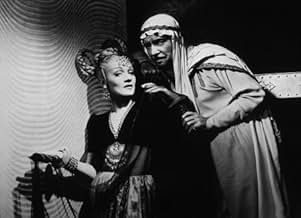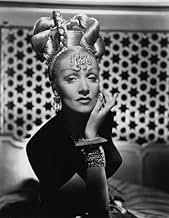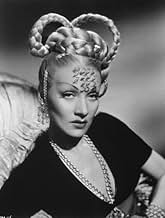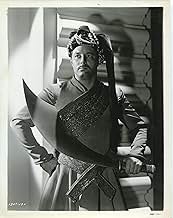IMDb RATING
6.0/10
1.4K
YOUR RATING
In ancient Baghdad, Hafiz the King of Beggars dreams of untold riches and of marrying his daughter to a real prince.In ancient Baghdad, Hafiz the King of Beggars dreams of untold riches and of marrying his daughter to a real prince.In ancient Baghdad, Hafiz the King of Beggars dreams of untold riches and of marrying his daughter to a real prince.
- Director
- Writers
- Stars
- Nominated for 4 Oscars
- 1 win & 4 nominations total
Eddie Abdo
- Aide to Mansur
- (uncredited)
- …
Jimmy Ames
- Major Domo
- (uncredited)
Morris Ankrum
- The Caliph's Messenger
- (uncredited)
Leslie Anthony
- Handmaiden
- (uncredited)
Lynn Arlen
- Handmaiden
- (uncredited)
Noble Blake
- Nubian Slave
- (uncredited)
Carla Boehm
- Handmaiden
- (uncredited)
Dick Botiller
- Aide to Mansur
- (uncredited)
- Director
- Writers
- All cast & crew
- Production, box office & more at IMDbPro
Featured reviews
To be bothered by he fact that all the principals of this movies were Western is to miss the point. This is a document of a given time and place (Hollywood in 1944). Ronald Coleman was born to play the part of the poetic beggar prince. Who could be better to declaim the bits of Omar Khayam in the script. It's a little like his take on Francois Villon in "If I Were King". Marlene Dietrich is magnificent as a Macedonian princess in the Grand Vizier's harem. She does a beautiful and seductive dance. Edward Arnold supplies real menace as the heavy just as he did in "Meet John Doe". The whole premise of a movie like this is naive and unhistorical but the production was so ambitious and sumptuous that it transcends that shortcoming.
10Molly-31
William Dieterle directing, music by Harold Arlen (there's even a tiny bit of the Witch's Guard music at one point!), opulent sets and gorgeous costumes, Ronald Colman -- what more could anyone ask?
The film was very carefully crafted. Even the bit players -- especially Henry Davenport and Florence Bates -- were perfect. From the beginning, you are immersed in a magical world, an Iraq that died long ago, the Islam of Arabian Nights and Haroun el-Raschid, a romantic culture with its own philosophies and mysteries. Karsha foretelling the future with a sand reading, the muezzin and his apprentice singing the call to prayer, or the public bathing place that the rascals hide in, give the film a sense not only of unity and atmosphere but of meticulous attention to detail.
Dietrich's character was not Greek but Macedonian (like Alexander the Great, another blonde). I could have stood for more authenticity in her dance (especially after the Kraft girls who preceded her -- their Deva Dasi style dance *was* pretty authentic) and that gold paint was a little much. Still, the idea was that Jamilla was wild, and did unconventional things.
I do see where it could have been better. Craig in particular sounds jarringly "modern". But you forget that after a while. Modern films don't present this kind of idealism. We have to have everything brought down to sordid reality. A thing like this is good for you after too much "realism" gunk.
The film was very carefully crafted. Even the bit players -- especially Henry Davenport and Florence Bates -- were perfect. From the beginning, you are immersed in a magical world, an Iraq that died long ago, the Islam of Arabian Nights and Haroun el-Raschid, a romantic culture with its own philosophies and mysteries. Karsha foretelling the future with a sand reading, the muezzin and his apprentice singing the call to prayer, or the public bathing place that the rascals hide in, give the film a sense not only of unity and atmosphere but of meticulous attention to detail.
Dietrich's character was not Greek but Macedonian (like Alexander the Great, another blonde). I could have stood for more authenticity in her dance (especially after the Kraft girls who preceded her -- their Deva Dasi style dance *was* pretty authentic) and that gold paint was a little much. Still, the idea was that Jamilla was wild, and did unconventional things.
I do see where it could have been better. Craig in particular sounds jarringly "modern". But you forget that after a while. Modern films don't present this kind of idealism. We have to have everything brought down to sordid reality. A thing like this is good for you after too much "realism" gunk.
More Arabian Nights stuff, this time emanating from the studio where the lion roared: according to the Internet Movie Database, there are twenty (count 'em) films that go by the name of KISMET and, although the Vincente Minnelli-Howard Keel musical version is the best-known of the lot, this earlier straight adaptation starring Ronald Colman and Marlene Dietrich is perhaps the best-regarded. For the record, I do have the former on VHS but won't have time to catch it just now and, of all the rest, I'm mostly interested in the 1930 German version (there was another one made in Hollywood the same year) which, like the film under review, was directed by William Dieterle! Speaking of which, I don't quite understand the reasoning of Warner Brothers (who have inherited DVD distribution rights to the MGM film library) behind recently releasing the 1955 version on this format on its own (so to speak, since it actually forms part of a Musical Collection) rather than coupled with the earlier version.
Aged 53, Ronald Colman still cuts a strikingly handsome figure (even when dressed as a beggar) and his silvery hairline is amusingly obscured by the most unseemly of turbans for all but one scene in the film's latter stages. Equally splendid-looking is his 43-year old German co-star who, in the film's most celebrated sequence that was, ironically, later cut for TV screenings because of its 'erotic' content(!), has her legs painted in gold for a veiled dance number before the court of evil Grand Vizier Edward Arnold and Colman (who dubs himself the King of Beggars by day but moonlights as a sovereign of a far-away land). Given the maturing age of the two leads, it's no wonder that two younger actors were recruited in the persons of James Craig (as the Caliph of Bagdad who likes to go incognito through the streets of his kingdom as a gardener's son) and the late Joy Page (Colman's secreted daughter); she had made a memorable screen debut in CASABLANCA (1942) and died earlier this year aged 83.
The cast is rounded up by Florence Bates (as Colman's nagging in-law), Harry Davenport (as Craig's wily adviser) and Hugh Herbert (as one of Colman's would-be comic-relief sidekicks). As was to be expected from Hollywood's premier studio, no expense was spared in bringing this opulent costumer to the screen including shooting in eye-filling Technicolor amidst impressively-constructed sets and this effort was rewarded by garnering the film four Academy Award nominations in that year's ceremony although, as had been the case (and would be again) with similar Oriental ventures, the nominees all went home empty-handed!
Aged 53, Ronald Colman still cuts a strikingly handsome figure (even when dressed as a beggar) and his silvery hairline is amusingly obscured by the most unseemly of turbans for all but one scene in the film's latter stages. Equally splendid-looking is his 43-year old German co-star who, in the film's most celebrated sequence that was, ironically, later cut for TV screenings because of its 'erotic' content(!), has her legs painted in gold for a veiled dance number before the court of evil Grand Vizier Edward Arnold and Colman (who dubs himself the King of Beggars by day but moonlights as a sovereign of a far-away land). Given the maturing age of the two leads, it's no wonder that two younger actors were recruited in the persons of James Craig (as the Caliph of Bagdad who likes to go incognito through the streets of his kingdom as a gardener's son) and the late Joy Page (Colman's secreted daughter); she had made a memorable screen debut in CASABLANCA (1942) and died earlier this year aged 83.
The cast is rounded up by Florence Bates (as Colman's nagging in-law), Harry Davenport (as Craig's wily adviser) and Hugh Herbert (as one of Colman's would-be comic-relief sidekicks). As was to be expected from Hollywood's premier studio, no expense was spared in bringing this opulent costumer to the screen including shooting in eye-filling Technicolor amidst impressively-constructed sets and this effort was rewarded by garnering the film four Academy Award nominations in that year's ceremony although, as had been the case (and would be again) with similar Oriental ventures, the nominees all went home empty-handed!
'Kismet' marked Marlene Dietrich's final concession to Hollywood frivolity before getting into uniform for the sake of war work in Europe by appearing in Metro's version of the sort of Technicolor nonsense Maria Montez was currently making for Universal; albeit with a much starrier cast.
An Arabian Nights fantasy of the type being made back in Germany when William Dieterle was there directing silents (including a couple featuring Dietrich) with remarkably similar production design. Despite Ronald Colman's usual quiet authority in the lead, its most memorable feature has to be Dietrich performing - in the only one of her four scenes lasting longer than a minute - an exotic 'dance' with - as Elkan Allan once described it - "that fabulous body painted gold", owing more to editing than choreography and anticipating Shirley Eaton in 'Goldfinger' by twenty years.
An Arabian Nights fantasy of the type being made back in Germany when William Dieterle was there directing silents (including a couple featuring Dietrich) with remarkably similar production design. Despite Ronald Colman's usual quiet authority in the lead, its most memorable feature has to be Dietrich performing - in the only one of her four scenes lasting longer than a minute - an exotic 'dance' with - as Elkan Allan once described it - "that fabulous body painted gold", owing more to editing than choreography and anticipating Shirley Eaton in 'Goldfinger' by twenty years.
Third movie version of popular story involving beggar/magician in Bagdad who impersonates a prince. Meanwhile, the beggar's daughter falls for a camel-boy who's really a prince in disguise! Somehow, Marlene Dietrich gets shoehorned in playing sheltered royalty who rebels by doing a hot dance routine which must've been pretty risqué for 1944 (she's slathered in gold paint). MGM adventure does a nice job rewriting the original play by Edward Knoblock, featuring a colorful production and welcome comedic elements. It's jaunty fun with a fairly fast pace, hindered only by Ronald Coleman's miscasting in the lead (and his surprising lack of chemistry opposite Dietrich). Nominated for four Oscars, including Charles Rosher for his cinematography. Remade as a musical in 1955. **1/2 from ****
Did you know
- TriviaAn uncredited Frank Morgan is the Narrator who introduces the characters and plot at the beginning of the film.
- GoofsRonald Colman's character eats with his left hand, which is taboo in Arabic culture.
- ConnectionsFeatured in That's Dancing! (1985)
- SoundtracksTell Me, Tell Me, Evening Star
(1944) (uncredited)
Music by Harold Arlen
Lyrics by E.Y. Harburg
Partially sung by Marlene Dietrich
Sung by Joy Page (dubbed by Doreen Tryden)
Everything New on HBO Max in September
Everything New on HBO Max in September
We're excited for "Task," a new crime series from the creator of "Mare of Easttown." See everything else coming to HBO Max this month.
- How long is Kismet?Powered by Alexa
Details
- Release date
- Country of origin
- Language
- Also known as
- Oriental Dream
- Filming locations
- Production company
- See more company credits at IMDbPro
Box office
- Budget
- $3,000,000 (estimated)
- Runtime
- 1h 40m(100 min)
- Aspect ratio
- 1.37 : 1
Contribute to this page
Suggest an edit or add missing content





































